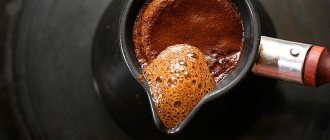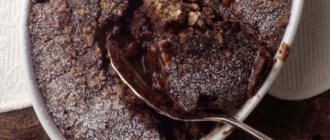What is the relationship between coffee and constipation?
Can coffee cause constipation? – lovers of this drink who suffer from digestive problems are often interested. Experts do not rule out this possibility; moreover, under certain conditions, the connection between coffee and constipation will be quite close.
To understand the mechanism of action of coffee on the body and understand how it can be consumed as safely as possible, you should carefully study the information below.
Could there be constipation?
Sometimes people experience constipation from drinking coffee. Such changes are due to the diuretic properties of the drink. At the same time, fluid is removed from the body and the stool in the colon begins to harden. Therefore, coffee lovers are advised to drink sufficiently large amounts of liquid throughout the day.
Stool consolidation is most often observed in those who abuse coffee drinks and exceed the permissible dosage.
In this case, the intestines are greatly depleted and are unable to digest food. This leads to constipation.
Physiological effect on the body
It will be much easier to answer the question of whether it is possible to drink coffee for constipation if we understand how this drink acts on the body.
Natural coffee is characterized by:
- Toning effect. Caffeine acts as a stimulant, promoting more active functioning of most body systems.
- Stimulation of peristalsis. Under the influence of caffeine and other substances contained in coffee, intestinal motility is activated, which ensures more active movement of contents (including towards the rectum).
- Stimulating the functioning of the glands. When drinking high-quality natural coffee, the body actively produces gastric juice, improving the digestion process. At the same time, the secretion of bile is stimulated and the bile ducts relax - thanks to this, the emulsification of fats during digestion is also more effective.
If we talk about natural coffee, it rarely causes constipation.
Thus, drinking small doses of coffee has an overall positive effect on the body and the digestive system. Now it’s worth analyzing whether coffee causes constipation, and if not, where did this statement come from?
Could there be constipation?
Sometimes people experience constipation from drinking coffee. Such changes are due to the diuretic properties of the drink. At the same time, fluid is removed from the body and the stool in the colon begins to harden. Therefore, coffee lovers are advised to drink sufficiently large amounts of liquid throughout the day.
Stool consolidation is most often observed in those who abuse coffee drinks and exceed the permissible dosage.
In this case, the intestines are greatly depleted and are unable to digest food. This leads to constipation.
Is it possible to drink coffee if you are constipated?
According to doctors, drinking coffee for constipation is not only possible, but also necessary. True, in moderation. Thanks to this, intestinal activity is stimulated and the process of excretion of feces is simplified.
If the fixing effect is caused specifically by coffee drinks, it is better to temporarily abandon them or start drinking coffee with milk.
Effect on digestion
As part of the enormous demand, special importance is attached to research on the quality of coffee beans and its effect on the human body from the point of view of a specialty drink. The chemical composition depends on the type of coffee bean and its ripening period. The most common varieties include:
- Arabica (it has been proven that this variety produces a higher quality drink and has a soft, slightly sour taste);
- robusta (contains approximately twice as many alkaloids, has a strong, slightly astringent taste).
The main functional properties are due to the content of chlorogenic acids, which have antioxidant activity. Their concentration directly depends on the time of heat treatment to which the grains were subjected before the actual preparation of the drink. The degree of roasting is taken into account (preferably light or medium). And also the time of exposure of ground grains in hot water at a constant temperature.
Coffeestol and kahweol are present in the chemical composition of the drink. These substances fight carcinogens and have hepatoprotective properties. A special role today is given to the study of soluble dietary fibers (galactomannan and type II arabinogalactan) contained in coffee beans. They are not digested during digestion, but once they enter the large intestine, they act as a substrate for the proliferation of beneficial intestinal microflora. This affects metabolic processes, reduces cholesterol levels, and has a beneficial effect on glucose and insulin response. The microbiota that inhabits the intestines of a person who drinks good natural coffee ferments ingested polysaccharides, improves pH levels, stimulates the growth of beneficial lactic acid bacteria and prevents the proliferation of pathogenic microorganisms.
With all the described beneficial properties, the question remains open: is it possible to drink coffee for constipation?
Coffee as a laxative
Due to the content of chlorogenic acid in the drink, the drink, when it enters the stomach, enhances the production of gastric juice and activates digestive processes. Under the influence of acid, the hormones gastrin and cholecystokinin are produced, stimulating intestinal motility.
Sometimes, in people who have the habit of drinking a cup of coffee every day after waking up, the body independently builds its biorhythms so that even after stopping drinking the drink at the set time, the urge to defecate may occur for several days in the morning.
Decaffeinated coffee is most suitable for use as a laxative drink. The fact is that caffeine partially dehydrates the body. Without caffeine, food that passes from the stomach to the intestines retains moisture, and the laxative effect becomes more pronounced.
Coffee as a fixative
Despite all the beneficial properties, some people make a connection between coffee and constipation. Can coffee cause constipation? Drinking a high-caffeine drink in large doses can dehydrate the body and cause hardening of the stool. Their progress through the intestines will slow down. This is due to its diuretic effect. However, as the results of studying the influence of coffee show, constipation is more likely to be caused by other foods consumed and a sedentary lifestyle.
For lovers of the product who are faced with digestive upset in the form of diarrhea, but are not ready to give up their favorite taste, drinks that are similar in taste to traditional coffee can help:
They are able to reduce the load on the pancreas, reduce pain, combat increased gas formation, and restore the balance of microelements. It should be noted that this is true for minor digestive disorders.
If there is fever, vomiting or other serious health problems, you should consult a doctor.
Can it be used continuously as a laxative?
Experts note that all the features of the impact on the human body of a wide range of elements found in coffee have not yet been studied in detail. Constipation can be a consequence of poor diet, stress, chronic diseases and their exacerbations.
Regular consumption of coffee as a laxative clearly indicates the presence of persistent problems with stool. Accordingly, it is initially necessary to contact qualified doctors in order to accurately diagnose the cause of disturbances in the gastrointestinal tract and prevent the worsening of the disturbances.
When drinking coffee, it should be taken into account that it will have a negative effect on an empty stomach due to the production of hydrochloric acid, which in excess will provoke an increase in acidity, the development of gastritis and can even cause the formation of peptic ulcers.
Often chronic constipation is accompanied by hemorrhoids, or provoked by it. In this case, you definitely can’t abuse coffee, because... Increased doses of the drink can cause spasms and increase pain.
You should only use coffee as a laxative after consulting your doctor.
What type of coffee has a fixing effect?
Due to the presence of a high concentration of caffeine in the composition, stool consolidation is possible when drinking a drink based on robusta beans. Also, hardening of stool is observed from sweet espresso, which provokes intestinal spasms and difficulty in emptying.
Acorn coffee also strengthens. This effect is noted due to the presence of the following substances in its composition:
- starch . Easily digested and has a strengthening effect;
- tannins . Prevents the development of diarrhea and other disorders in the gastrointestinal tract;
- Quercetin. Helps relieve spasms and eliminate pain.
In addition, acorn drink is rich in carbohydrates and proteins necessary for the body. This is a natural antibiotic that can effectively fight diarrhea and eliminate lesions localized on the intestinal mucosa. However, the use of this remedy in the presence of the following symptoms will not give the desired result:
- hyperthermia;
- gagging;
- dizziness;
- the presence of blood and mucus in the stool;
- dyspnea.
In this case, medical attention is needed.
Why is constipation possible?
Constipation after coffee drinks occurs in cases where the body is dehydrated and there are fecal stones in the large intestine. This is a serious problem, since the mucous membrane, consisting of hairs that absorb water, does not work. Consequently, the body does not receive all the necessary nutrients.
In women over 50, congestion in the gastrointestinal tract is possible. This depends on a decrease in estrogen levels and atony of the colon walls. If you start abusing coffee, trying to improve the functioning of internal organs, you can provoke a large consumption of calcium and an increase in bone fragility.
Constipation occurs more often when drinking instant drinks, since they contain more different chemicals, especially in cheap varieties. It is recommended to completely remove soluble mixtures from the diet.
Coffee made from acorns is invigorating, as it contains starchy and tannin substances, natural antibiotics that heal microcracks in the intestinal walls and eliminate irritation and spasms. For frequent diarrhea, a drink made from acorns is recommended.
Arabica and Robusta have different amounts of caffeine. There is twice as much of it in Robusta. There are people who prefer a very bitter drink, considering it an indicator of quality. You can dehydrate the body with Robusta very quickly, while the gastrointestinal tract will react first, then it will be the turn of the kidneys and nervous system. If you drink Robusta, you need to double the amount of water so as not to upset the balance of electrolytes.
Nine foods to help relieve constipation
Water
More than half of constipation cases are due to dehydration. Therefore, water turns out to be the most powerful tool in the fight against this problem. Often, processed foods in the intestines are in a too dry state, which reduces the efficiency of this organ, which becomes sluggish and inactive.
All you need to do is drink two liters of regular water per day. Thanks to this, the volume of fluid in the body will be restored, and the digestive system will begin to work effectively. Water is the cheapest and most effective laxative.
To get rid of constipation, you need to know how to drink even plain water correctly. When the problem has already appeared, drink a glass of cooled boiled water every morning, and about six more glasses a day. To make the water better absorbed and more pleasant, you can add a little lemon to it.
Coffee
Abuse of coffee is not recommended in principle. The fact is that it has negative consequences for the heart, blood vessels, and because of it, blood pressure increases. But if you have problems with stool, this drink becomes an effective laxative.
Coffee has the ability to tone different parts of the human body, in particular the gastrointestinal system. It also promotes the release of bile, which leads to the urge to defecate. It is worth noting that only natural, fresh coffee has a positive effect.
Vegetables
The third place in the fight against constipation is occupied by fresh vegetables, because they contain fiber. Vegetable fibers are not digested, which promotes active wave-like compression of the intestinal walls and better passage of processed products. The most effective vegetables are: cabbage, carrots and beets. We recommend that you familiarize yourself with the “Broom” vegetable salad, which will be extremely useful for people with constipation.
First, finely chop the vegetables, add salt and mix. For dressing we use any vegetable oil. A few minutes of cooking and an excellent, natural laxative is ready. Regular consumption of this salad instead of heavy foods will relieve constipation.
Bran
The shell of grains that is removed before consumption is bran. A long time ago, people came up with the idea of removing the shell from grains and selling them as a separate, usable product. But it turned out that flour products made from such grains can cause problems with stool. Therefore, people with a similar problem should not eat white bread.
Bran, on the contrary, is quite healthy, as it contains fiber, which promotes better functioning of the gastrointestinal tract. Where can I get them, and how to use them correctly for medicinal purposes? You can buy bread with bran.
You can also look for packaged bran, which is sold in diet aisles. They are added to soup, salad, and baked goods. In the morning, for breakfast, it is recommended to drink 250 g of kefir with a tablespoon of bran, or drink the drink instead of dinner.
Fruits
Like vegetables, fruits contain quite a lot of fiber. Therefore, it is advisable for people suffering from constipation to eat fruits every day. Apples are especially useful in this case. They contain a large amount of tissue that is not digested and a sufficient amount of pectin. Pectin is a useful polysaccharide substance that helps remove waste and toxins from the body.
An apple is a storehouse of vitamins and valuable microelements. It is one of the most valuable remedies for constipation. As they say in England: “An apple a day – no need for a doctor!”
Kefir and yogurt
Even in ancient times, people learned about the laxative effect of kefir and yogurt, the use of which helped to get rid of problems with constipation. Fermented milk products contain a sufficient amount of probiotics, which help saturate the gastrointestinal system with valuable bacteria and normalize the microenvironment. Normally functioning microflora helps the intestines remove processed foods in a timely manner. The important fact remains that you need to use only natural kefir and yogurt, preferably home-made.
Melons
This group includes: pumpkin, melon, watermelon. Both children and adults love these cultures. They are sweet and nutritious, but most importantly, melons have strong laxative properties and can help with bowel problems.
Like vegetables, they contain a lot of fiber, like fruits they contain pectin, and like coffee they promote better bile secretion. It is recommended not to mix melons with other products for the best effect. It is difficult to disagree with the statement that it is better to treat constipation with watermelon than with medications.
Leafy greens
Leafy greens are essential for proper bowel function. This product is almost one hundred percent fiber. In addition, greens contain many vitamins and minerals, which improve the functionality of the stomach and perfectly prevent constipation. Residents of the Caucasus know the benefits of leafy greens, which is why they are present in many of their dishes.
They use dill, cilantro, lettuce, celery, and many other greens. That is why it is not in vain that they talk about “Caucasian” longevity. Try adding different types of leafy greens to your food, do it regularly, preferably a handful every day. Soon you will notice that problems with stool have disappeared.
Rhubarb
Few people use rhubarb in cooking. And many have never even tried the plant. You need to know that the rhubarb stem contains quite a lot of useful substances - many minerals and acids that help improve the functioning of the gastrointestinal tract. It has a laxative effect. You can prepare a rhubarb salad, or cook compote. Try it, because if you have problems with bowel movements, you will almost immediately feel relief.
General recommendations
If you are concerned about chronic constipation, first of all pay attention to your diet. The food consumed should be rich in fiber and vitamins. It is recommended to eat different cereals daily.
Buckwheat and oatmeal porridge are especially useful. It is better to exclude rice porridge and semolina from the diet or limit its consumption. This is especially true for children and the elderly.
As you can see, this kind of delicate problem can be solved without a doctor or taking medications, but by adding natural products to the diet that help with constipation. Use our tips to maintain and restore your health!
Laxatives in coffee
Why coffee acts as a laxative depends on several reasons:
- Gastrointestinal diseases described above.
- The presence of chlorogenic acid, which irritates the intestinal walls and causes them to contract faster. There is no chlorogenic acid in tea, so it does not weaken.
- Increased production of gastrin hormones by the pancreas and stomach - there are only 3 types. They stimulate the production of hydrochloric acid, blood vessels dilate and blood flow to the digestive organs increases. The small intestine also has receptors that are sensitive to gastrin, so it also reacts to its increase and begins to contract.
- An increase in gastrin stimulates the production of cholecystokinin in the duodenum, that is, the gastrointestinal tract is completely mobilized to digest food.
From this we can conclude that coffee has a laxative effect if consumed on an empty stomach.
Caffeine does not have a laxative effect, since it dehydrates the tissues, which rather causes the opposite process - coffee hardens the stool.
Laxative for weight loss
Coffee can be used as a laxative for weight loss. This is especially true with a protein diet, since protein takes longer to digest in the body and causes constipation.
There is a warning regarding the protein diet and coffee: these two factors put a lot of strain on the digestive system and the body as a whole, so the creators of the diet recommend drinking 3 times more water per day than with a normal diet.
Video: A cup of coffee in the morning will not help relieve constipation
This is due to the diuretic effect of caffeine and the increased content of nitrogenous substances in the blood after digestion of protein foods. It is necessary to restore the water-salt balance and at the same time help the kidneys remove uric acid from the tissues.
Otherwise, you can develop gout - the deposition of uric acid salts in the joints, severe pain and swelling, which can only be eliminated with diet and water.
When losing weight, coffee acts as a laxative. After going to the toilet, you may find that your weight has dropped slightly. This is a misleading result, since feces and fluid have come out of the tissues. The fat can remain intact and the body shape will not change.
You can't limit yourself to water when trying to lose weight. This is fraught with kidney disease and the formation of gallstones.
Dairy additives - how they affect peristalsis
If coffee weakens the intestines, then with milk this process goes faster in those people who do not tolerate dairy products well. Due to fermentation processes, feces have a liquid consistency. Whether coffee with milk strengthens or weakens stool depends on the individual characteristics of the gastrointestinal tract.
Heavy cream and plant-based milk analogues can give different effects, so you need to try all the products and choose for yourself those that do not cause any discomfort.
What determines the effect of coffee on intestinal health?
For each person, the effect of coffee manifests itself individually. But the main symptom can be considered the desire to visit the toilet, because according to research, this desire occurs in the majority of the inhabitants of our planet. In addition, the following may play a significant role:
- individual intolerance to the components that make up coffee;
- improper preparation of the drink;
- adding products such as milk and sugar;
- adding all kinds of flavorings and flavorings;
- drink temperature;
- low-quality raw materials used to create coffee;
- stressful situations, weakened immunity of the body.
Once you drink it, coffee begins to have an effect on your body within half an hour after consumption. The nature of symptoms and their severity can vary greatly from person to person, so it's important to pay attention to how coffee affects you and your gut. If symptoms appear suddenly and unexpectedly, then this is a good reason to consult a specialist, as this may be a sign of the development of certain diseases. In this article I talked about 10 reasons to stop drinking coffee.
How to avoid stomach upset from coffee?
There are several recommendations that will help minimize the likelihood of developing stomach upset after drinking coffee.
Drink coffee in small sips
If you drink coffee in a hurry, and in large quantities, then you have a high chance of getting an upset stomach. Try to drink coffee slowly, in small sips. This way, the intake of coffee into the body will be gradual, which will not come as a surprise to your stomach. Accordingly, the body's reaction will be milder.
Don't drink coffee on an empty stomach
Coffee by nature is an acidic product. Therefore, it is not recommended to consume it on an empty stomach. Try to drink coffee during meals. This will stretch the flow of caffeine and acids into the body, which will ease the stomach reaction.
Choose dark roast coffee
Research shows that coffee beans that have been roasted longer and at higher temperatures contain less acid than beans that have been lightly roasted. Accordingly, the less acids in coffee, the better for your stomach.
Coarse grind
When brewing coarsely ground coffee beans, much less acid is released than when brewing finer ground coffee.
Cold coffee
Many studies have shown that cold brew coffee contains less acid than freshly brewed hot coffee. So try drinking iced coffee. It is especially pleasant to drink this coffee in the summer.
Additives in coffee
If you are lactose intolerant or notice that after drinking milk you get an upset stomach, then replace it with alternative options. For example, you can add soy or almond milk to your coffee.
Drinking coffee for chronic constipation and other contraindications
Is it possible to drink coffee for chronic constipation? It is possible, but with some reservations:
- You need to drink a natural sugar-free drink in small doses (up to 2 cups a day);
- the strength and temperature of the drink should not be high;
- if the problem does not resolve within 1–2 days, you should resort to more effective therapeutic agents.
But coffee can only help if constipation is caused by poor diet:
- If you have gastritis or an exacerbation of a peptic ulcer, you should avoid coffee. Its use (and even more so its abuse) can cause serious digestive disorders, the direct consequence of which will be constipation;
- the same applies to pathologies of the gallbladder and bile ducts;
- It is worth considering the effect of coffee on other body systems. If you have arterial hypertension and hypertension, as well as nervous disorders, you should refrain from using strong stimulants, which include caffeine. Otherwise, negative consequences will affect the gastrointestinal tract.
Diuretic effect
No one will argue that black coffee is a strong diuretic. If, as studies show, not all people feel the laxative effect of drinking coffee, then the diuretic effect almost always occurs. But here scientists emphasize that the diuretic effect does not appear from one cup. This is exactly the property that this drink will have if you drink it from half a liter a day or more. It is important to understand here that the desire to go to the toilet will come with such an amount of coffee after a quarter of an hour and this is a natural need of the body. Moreover, if after drinking 500 ml cappuccino you don’t want to go to the toilet after 10-20 minutes, this is already a reason to worry: is everything working correctly in the body.
Effect of caffeine on the digestive system
A typical serving of espresso contains about 3 thousand active biological substances: caffeine, protein compounds, fats, sucrose, fiber, amino acids, vitamins, tannins, micro- and macroelements. All of them have a generally beneficial effect on the organs of the gastrointestinal tract (and on the entire body as a whole), if you do not exceed the established consumption rate.
The consequences of regular caffeine consumption include both positive and negative:
- accelerating the process of food digestion - the secretion of secretion, bile and digestive enzymes (pepsin, gastrin) is activated, and the proliferation of a certain type of bacteria is blocked, helping to improve metabolism;
- assistance in the absorption of nutrients - thanks to the function of enhanced production of digestive enzymes, caffeine helps to “extract” more useful elements from food and drinks and absorb them;
- the occurrence of heartburn and intestinal disorders - the increased acidity of coffee can lead to spasms of the gastric mucosa and the formation of ulcers, so it is recommended to drink it only after meals (in extreme cases, together);
- recognition of caffeine as gluten - the body can “confuse” two substances, as a result of which people sensitive to the latter may experience an allergic reaction: rash, swelling, migraine, weakness, etc.;
- reducing the risk of gastrointestinal diseases - coffee promotes the proliferation of beneficial bacteria in the intestinal microflora, normalizing its functioning;
- prevention of urolithiasis - coffee drinkers reduce the risk of kidney stones or inflammatory processes in the urinary tract (confirmed by various studies by scientists from Europe and the USA).
Caffeine contains a number of substances that affect the functioning of the body.
In search of an answer to the question of whether coffee strengthens or weakens stool, scientists initially made a statement that the drink enhances intestinal motility. In other words, it weakens him. But later it turned out that this effect is observed only in 60-70% of lovers of invigorating drinks, while for the rest it is the other way around.










